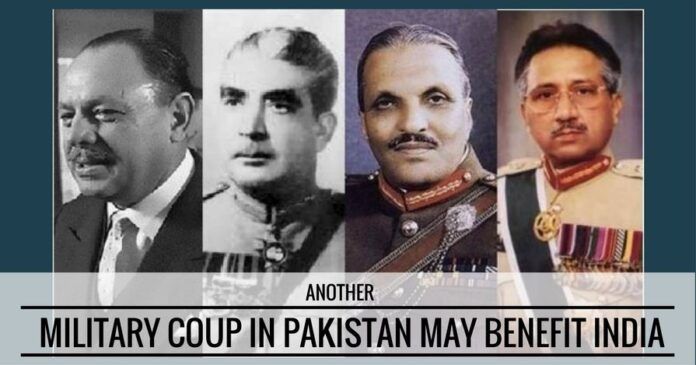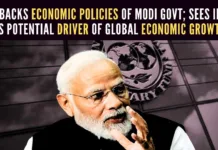
The possible impact of such a coup on the Kashmiris agitating for ‘Azadi’ in India must be considered as well
Hina Rabbani Khar, the former Foreign Minister of Pakistan, once famously remarked how certain people felt that a solution can be found for the Kashmir issue “if there is a BJP government in India and a military government in Pakistan”. What was the rationale behind such a statement?
As the Supreme Court of Pakistan disqualified Nawaz Sharif for life from the post of the Prime Minister for alleged corruption, fears rose once again across the eastern side of the border how Pakistan might for the umpteenth time be heading towards political instability. It is well known that Sharif, for his part, had tried to ease tension with the neighboring country, and might have significantly reduced the prevalent hostility with India if the Pakistan Army had not intervened repeatedly to sabotage all the efforts of peace from both Sharif and Modi.
“We are for United Nations Security Council resolutions. However, now we have left that aside.” – last military dictator of Pakistan — Pervez Musharraf in 2003
But now Sharif was gone, and this might be an opportunity – many in India apprehensively felt – for the Salafi jihadism-indoctrinated Pakistan Army to launch yet another military coup and take full and formal control of the country. And if such a thing happened, what chances would be left of reduction of tension between the nuclear-armed arch-rivals?
History of the last military rule in Pakistan, however, suggests that such fears aren’t very sound. Have a look at these words: “We are for United Nations Security Council resolutions. However, now we have left that aside.” Speaker? Former President — and the last military dictator of Pakistan — Pervez Musharraf.
Yep. Musharraf actually made that concession in 2003. The explosive concession of dropping a 50-year-old demand for a UN-mandated referendum in Kashmir – the only explosion Pakistan is virtually incapable of making at present. Did Musharraf go nuts?
No, pal. This is another instance where we see that if an institution (be it a party or an army) stably rules a nation, sanity might get better of an ideology. Of course, Cuba and North Korea have stable rules, but institutions do not rule those nations – too much power is concentrated in the hands of the dictator – which means these socialist autocracies haven’t seen the kind of ‘capitalist’ reforms that their sister states China and Vietnam have implemented. But even when an Ayub Khan or Zia-ul-Haq or Pervez Musharraf rules Pakistan, they remain answerable to the Army, yet at the same time providing a stability to the country which ensures that anti-national policies guided by ideological dogma get corrected. And what could be more anti-national than hostility with a nation that has the third largest economy in the world in terms of PPP and is widely expected to be an economic superpower eventually?
We sometimes tend to underestimate the power of democracy, though it should not be underestimated at all.
But there is another interesting side to this if we consider the Balochistan issue. Many in India would love the present insurgency in Balochistan to see a fruitful end, resulting in the creation of a Balochistan nation just like Bangladesh. But two facts tell us that such a desire is wishful thinking:
a) Unlike Bangladesh, Balochistan is geographically attached — well-attached in fact — to Pakistan
b) Pakistan didn’t possess nuclear weapons at the time of the Bangladesh Liberation War.
Fact (b), particularly, completely rules out the prospect of Modi doing an Indira Gandhi and militarily intervening in Balochistan. The most we can expect Modi to do is to ‘raise’ the Balochistan issue, both domestically and internationally, and he has already done that.
But does that mean there is zero chance of Balochistan’s becoming independent? Not really. Although India can’t militarily break up Pakistan once again, the breaking up can still happen if it is engineered by the insurgent Baloch forces within. But we must recognize one crucial reality here: it is a lot easier for the inner rebellion to break up an autocratic nation than doing so in case of a democratic country. Who tells this? History. Remember the disintegration of the socialist dictatorial state of Yugoslavia? And even if you don’t, you surely, surely must be remembering how the powerful, autocratic, nuclear-armed superpower state of Soviet Union broke up into pieces? And.. why do you think all secessionist movements in India have failed till now?
Yeah, we sometimes tend to underestimate the power of democracy, though it should not be underestimated at all. And when we realize this power, we also realize that the biggest roadblock to Balochistan’s independence is not the fact that Pakistan has less democracy, but too much of it. But if the Pakistan Army takes over the nation and the Constitution is thrown to the dustbin, will bullets continue to remain sufficient to hold the creaking nation together?
Lastly, the possible impact of such a coup on the Kashmiris agitating for ‘Azadi’ in India must be considered as well. If the Pakistan Army wipes out democracy from their nation to an extent not seen before, will the Islamic Republic continue to enjoy the same goodwill among the Valley people in India? Unlikely. Of course, it’s not like they will start hating Pakistan overnight. But Pakistan’s credibility to help them achieve ‘Azadi’ will be considerably damaged when they’ll see that people in Pakistan are enjoying anything but ‘Azadi’.
Note:
1. The views expressed here are those of author and do not necessarily represent or reflect the views of PGurus.
- How BJP can capture the full Marathi space from Shivsena - September 29, 2017
- Another military coup in Pakistan may actually be beneficial for India - September 18, 2017











worlds 3rd biggest economy?
half of indias cities are still slums.
get arrogant when u r actually rich.